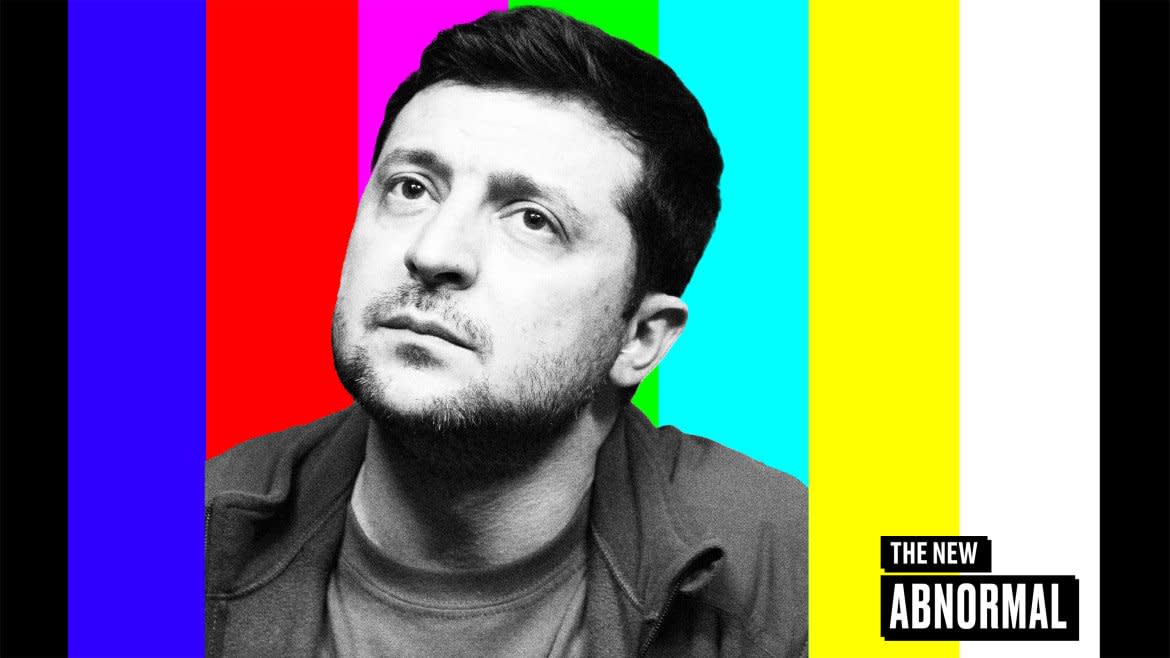How Zelensky Went From Jackie Mason to Winston Churchill

- Oops!Something went wrong.Please try again later.
Nearly two weeks into Russia’s invasion of Ukraine, New Lines news director and Daily Beast editor-at-large Michael Weiss joins The New Abnormal to explain how and why the Ukrainians have defied everyone’s expectations except their own.
“I think the Ukrainians were right about themselves in a way that we were not, meaning that the Western nation has underrated them and underestimated them quite badly. And you see this now, I mean the world is completely inspired by their resistance, completely inspired and shocked in a good way by their president who went from being the Jackie Mason of Ukraine into Winston Churchill within the space of that 72 hours,” says Weiss. “And I think one of the reasons that everyone wants to support them—diplomatically, financially, militarily—is because they’ve held out. Their capital was meant to fall in a matter of hours, if not days, and Zelensky was meant to be assassinated. And here we are on day 11, and he’s still alive, still in firm control of his armed forces and Kiev is surrounded, but it has not fallen—it has not been breached by the Russians.”
Subscribe to The New Abnormal on Apple Podcasts, Spotify, Google Podcasts, Stitcher, Amazon Music, or Overcast.
As for the Russians, Weiss says: “I mean, the term Potemkin comes from Catherine the Great and that period, and the Russians are past masters at trying to pass off something that on the surface looks to be quite robust and shiny and new but deep down is just as susceptible to the kind of rot and corruption and backwardness and inefficiency that has frankly plagued all state institutions under Putin for the last 22 years. So in hindsight, it’s not so shocking that the Russian military has succumbed to exactly the same problems that everything else in Russia has succumbed to, whether it’s the financial markets or small businesses.”
And now the casualties are piling up: “This is kind of the big fear politically (and) socially inside Russia for Putin, [it] is the phenomenon of what’s known as cargo 200—the euphemism for dead bodies coming back from the front. This is what ended up really destroying the Soviet Union after the war and occupation of Afghanistan.”
In hindsight, says Weiss, the disappearance of Russian troops during their dirty war in eastern Ukraine over the past eight years, before the full-on invasion, was a sign of what’s come as “a lot of conventional Russian forces who had deployed there simply vanished from the face of the earth. Their families inquired, where were they? You know, did they fall in the line of duty or combat? What happened? And the Russian government was trying violently to hush this up.”
Video Game War Forgeries Are Giving a Boost to Russia
Plus, Steven Brill of NewsGuard looks back at his group’s conversations with Facebook about moderating content on the platform: “We talked to senior executives there who said, ‘This is a great idea. You should do it. It’ll take us out of our misery. We’ve tried with algorithms to do this. We can’t do it. We’ve spent billions of dollars trying to do it. We know we can’t do it.’ And one of the senior executives there even helped us raise money by encouraging investors. If these guys build this, we’re going to use it. Unfortunately, we did not talk to the two most senior executives”—Mark Zuckerberg and Sheryl Sandberg—“who vetoed the idea of Facebook using us.”
And he shares: “One interesting story about RT: RT used to be called Russia Today. And then they decided, ‘Well, let’s just call it RT.’ So people won’t really know what it is. What they figured out was rather than have a cable television channel, which could be deplatformed off of the cable systems, they were going to dominate YouTube.”
And indeed, “They became the first video channel on YouTube news channel to have more than a billion views. And when they did that, they celebrated with a special RT program on YouTube, and they had the content officer of YouTube come on their program for the celebration.”
As for “the way RT got so many viewers on YouTube,” Brill explains that “they did videos of car crashes of hamsters on a hamster wheel. They did all this really cute or viral stuff. They amassed zillions of viewers. And then they started doing the propaganda once they had the viewers.”
It’s a model that others have followed, and NewsGuard now tracks, “where we identify sites that are sort of innocuous, local news sites. And the first tip-off we have is we can’t figure out who is financing it. And we can’t figure out what the business model is because they’re just doing, you know, news. There was one based in Buffalo, New York, during the 2020 campaign. And before the campaign, this site was just basically plagiarizing news from other local news sites, and we couldn’t figure out why it was there. They didn’t have any source of income. Why were they doing this? And then as the election got closer, they started doing all kinds of misinformation about the election, Stop the Steal stuff and stuff like that. There’s all of that going on because the really good news about the internet is that anybody can be a publisher. The bad news about the internet is that anybody can be a publisher.”
Listen to The New Abnormal on Apple Podcasts, Spotify, Amazon and Stitcher.
Get the Daily Beast's biggest scoops and scandals delivered right to your inbox. Sign up now.
Stay informed and gain unlimited access to the Daily Beast's unmatched reporting. Subscribe now.

